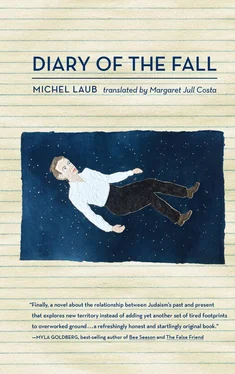My father gave me a tricycle when I was three, and the tricycle made the rattling sound you get when you tie the lid from a margarine carton to the rim of a bicycle wheel. The tricycle doubled as a truck and had a trailer too, into which I would put whatever I happened to find around the house, cushions, plates, towels, candles, a bottle of shampoo, and I would tell my father that I was delivering goods to various cities, and he would say, that’s more or less what your grandfather did when he first arrived in Brazil.
In every photo of my grandfather he’s wearing a suit and there’s no sign of the number tattooed on him at Auschwitz. My grandmother’s photographs were in frames on a shelf beside the table. All the furniture in my grandmother’s apartment was made of dark wood: chairs, a coffee table, a dressing table. Her bed was narrow and very soft, and it resembled my grandmother’s hair, almond brown and cotton white with a touch of purple, and after lunch on a winter’s day I used to enjoy lying there, reading comics.
I learned to read before I went to school, and my father would practice with me, showing me words in the newspaper and saying, what letter is that, and they were printed letters, quite different from the ones I would learn in the primer that schools used at the time, the a has its tummy on this side, without a back it’s a c , and with its tummy on the other side it’s a b , the snake is an s , and the noise the snake makes before it attacks is ssssss but when it’s sleeping zzzzzz , and the first word I read was house , and fixed to the edge of the writing desk where my father would sit to read the newspaper was a pencil sharpener with a handle, I remember the pencil box, the sound of the blade cutting into the wood, the effort involved, the blister on my finger.
My father would explain to me how sewing machines worked, about the thread, the engine, the different sorts of needle for backstitch, buttons, synthetics, embroidery, leather, and the pieces of cloth I would hold in my hand, eyes closed, while my father asked me, what is it, and I would have to say it’s linen, silk, synthetic, and when I was about ten years old I went to the main shop in the center of town, and my father summoned one of the shop assistants and made me repeat the experiment in front of him, and then the assistant took me out for an ice cream while my father stayed in the office, talking on the phone and endlessly tapping away on a calculator.
My father would come and pick me up from the rabbi’s house and he always asked, what did you learn today, and I would say, nothing, I just learned by heart a load of words I don’t even know the meaning of, and he would say, the rabbi should explain what those passages from the Torah mean. Every Saturday when someone is bar mitzvahed, a different text is read out, and it’s only at the actual ceremony that you touch the parchment itself, which is very white with the Hebrew characters printed or handwritten on it, with polished batons attached to the scrolls and a velvet cover to protect it from the light, and there you are in suit and shoes and a white tallit with a sky-blue pattern and a suede kippah with a gold sequin on top.
My school was on three floors and had a high wall around it and on the pavement outside there were flower planters on which the paint was almost concealed under a layer of dust, and which were, in fact, disguised steel blocks that reached two and a half meters down to protect the building against bomb attacks.
João always wore a crumpled plain T-shirt. I never saw him wearing one with a design on it. That was the present my mother bought for him, the fashion at the time was for surfing images, Rio de Janeiro landmarks, a seagull, a flash of lightning, a fishing pier.
The floor of the reception room where João’s birthday was held was tiled. He fell with a thud, which I heard because I was standing so close and because everyone had just finished shouting out thirteen , just a moment after the final syllable, which is usually more drawn out, either from enthusiasm or habit or perhaps anger.
When we left the party, we took a taxi. The taxis in Porto Alegre in the 1980s were rather drab, and the brake pedal made a noise like an old spring being released, which I suspect the drivers rather liked because they made a point of bringing up the pedal really quickly. The drivers sat on sheepskin seat covers in the cold weather and hung crab claws or images of saints on the rearview mirror.
While João was recovering I went to school and spent the morning alone, and during break I stayed in the classroom and ate a sandwich, because I’d started bringing my lunch from home, and sometimes the flask containing my cold drink would leak because I hadn’t closed the lid properly, and the butter and cheese and lettuce would end up sodden and sweet.
I can’t remember if it was hot or cold on the day I apologized to João. The first time he dived into our swimming pool the weather was as stifling as if it were January. Whenever João came to my house, he would show me the exercises he was doing, three hundred push-ups with his arms spread wide, as well as sit-ups and stretches, the equipment in the fitness room at the school gym was rather antiquated, with free weights and no lumbar supports.
On the few occasions I went to the coordinator’s office, the photographs were always the same, her son wearing a pirate hat, her daughter in a ballet outfit, and the drawings on the wall didn’t change either: paper kites, mountains, houses with one window above the front door, a smiling sun with eyes and hair.
When you’re known as a snitch, people eye you scornfully, but that isn’t always evident in the look on their face or some movement of their mouth or eyebrows, because very few show their feelings so overtly, and still fewer say anything beyond what those involved had already said, the other four who came to speak to me one by one and called me a son-of-a-bitch.
The way my father immobilized me on the day of the fight: his right arm wrapped around my neck, while he used his left to hit me.
The dispenser I threw at him had a roll of Scotch tape in it at the time. The acrylic base was about twenty centimeters long, weighed maybe two kilos, and the cutting edge had small metal teeth.
When my father came to speak to me on the day after the fight, he knocked three times on my bedroom door. My father was never ill when I was a child. He was never ill when I was fifteen, eighteen or twenty-five, and I don’t remember him being ill when he was fifty, fifty-five, sixty.
When I found out about my father’s illness, it was three o’clock in the afternoon and I went into a bar and ordered a beer. I drank the beer and ordered a whisky. The whisky immediately warmed me up, ethanol on a sunny day at a bar with a few nibbles and a candy-vending machine.
I thought about my father while I drank the whisky. And I thought I really should stop drinking. And I ordered another whisky, and then another and another, and the hours passed and then a moment came when I remembered what had happened, and I couldn’t possibly go home in that state because I didn’t want to explain and discuss the details of my father’s medical tests with anyone.
The lights at night are blurred and you walk along talking to yourself. It’s almost a joy to do that, knowing that no one is listening. One block before you reach a park. The damp, muggy air and the bus fumes. Fresh mud after the last rain shower. The scratched surface of a bench, no animals around, the results of my father’s tests in an envelope, just me and the silence, me lying down and the sense of imminent physical torpor, just relax and close your eyes and imagine some dark, isolated place and a warm, slow, constant rocking taking you nowhere.
Читать дальше












